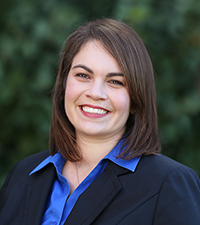BY STEVE DINNEN

What’s going on with this run on the alphabet?
All these initials might seem confusing, or even meaningless, to an outsider. But if you want your adviser to be as skilled as is possible, look at each of these abbreviations as shorthand for a particular postgraduate expertise that they have acquired to serve you better. Each abbreviation stands for a subset of skills that has added on to the CFP designation that, as Rosenstiel says, “is the cornerstone” to competent financial planning.
Meet Megan Rosenstiel, CFP and partner at West Des Moines-based financial advisory firm Gilbert & Cook. The CFP stands for certified financial planner, which is common in her field. But there’s more, as she also is a CDFA, an AWMA, an ADPA and a LTCP.
What’s going on with this run on the alphabet?
All these initials might seem confusing, or even meaningless, to an outsider. But if you want your adviser to be as skilled as is possible, look at each of these abbreviations as shorthand for a particular postgraduate expertise that they have acquired to serve you better. Each abbreviation stands for a subset of skills that has added on to the CFP designation that, as Rosenstiel says, “is the cornerstone” to competent financial planning.
Rosenstiel joined Gilbert & Cook nearly 15 years ago, and decided after earning the CFP, as well as securities sales licensing (series 7, 66, etc.), that other topics demanded her attention as well.
“How can I educate myself better?” she asked herself, responding with an ADPA—accredited domestic partnership adviser. That was before same-sex marriages were made legal, so she found herself at the forefront of working with domestic partners on topics such as apportioning out retirement plans.
Over time, Rosenstiel also chased down specialization as a certified divorce financial analyst (CDFA), a long-term care professional (LTCP) and as an accredited wealth management adviser (AWMA). They work with HNWs—high net worth individuals.
These designations can require a lot of preparation, expertise and effort. The National Association of Estate Planners & Council, for instance, mandates that anyone desiring its accredited estate planner (AEP) award first be a lawyer, CPA, trust officer or insurance or financial planner, with five years in their field and no disciplinary investigations. They’ll need two graduate-level courses, and must sit for an exam. As is the case with virtually every one of these designations, there are continuing education requirements.
Estates, divorces, long-term care, taxes, retirement plans—all these subsets of financial planning can carry specialization. One—certified kingdom adviser (CKA)—even needs your local pastor to weigh in. A CKA can integrate biblical principles with core financial planning, and there are at least 10 people in the Des Moines area who have that qualification.
We won’t go into all of the professional designations that a planner or adviser can earn—there are just too many. FINRA, the government-authorized overseer of brokers and dealers, can set your head spinning with its listing of more than 200 of them, at https://www.finra.org/investors/professional-designations.






